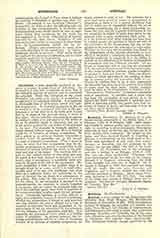

Acephali, a term applied to the Eutychians who withdrew from Peter Mongus, the Monophysite Patriarch of Alexandria, in 482. With the apparent purpose of bringing the orthodox and heretics into unity, Peter Mongus and Acacius of Constantinople had elaborated a new creed in which they condemned expressly Nestorius and Eutyches, but at the same time affected to pass over the decisions of the Council of Chalcedon and rejected them hypocritically. This ambiguous formula, though approved by the Emperor Zeno and imposed by him in his edict of union, or Henoticon, could only satisfy the indifferent. The condemnation of Eutyches irritated the rigid Monophysites; the equivocal attitude taken towards the Council of Chalcedon appeared to them insufficient, and many of them, especially the monks, deserted Peter Mongus, preferring to be without ahead (akephaloi,), rather than remain in communion with him. Later, they joined the partisans of the Monophysite Patriarch of Antioch, Severus. The Deacon Liberatus (Breviarium, P.L., LVIII, 988) supposes the name Acephali (Headless) to have been given to those at the Council of Ephesus who followed neither Cyril of Alexandria nor John of Antioch.
JOHN J. A’ BECKET

